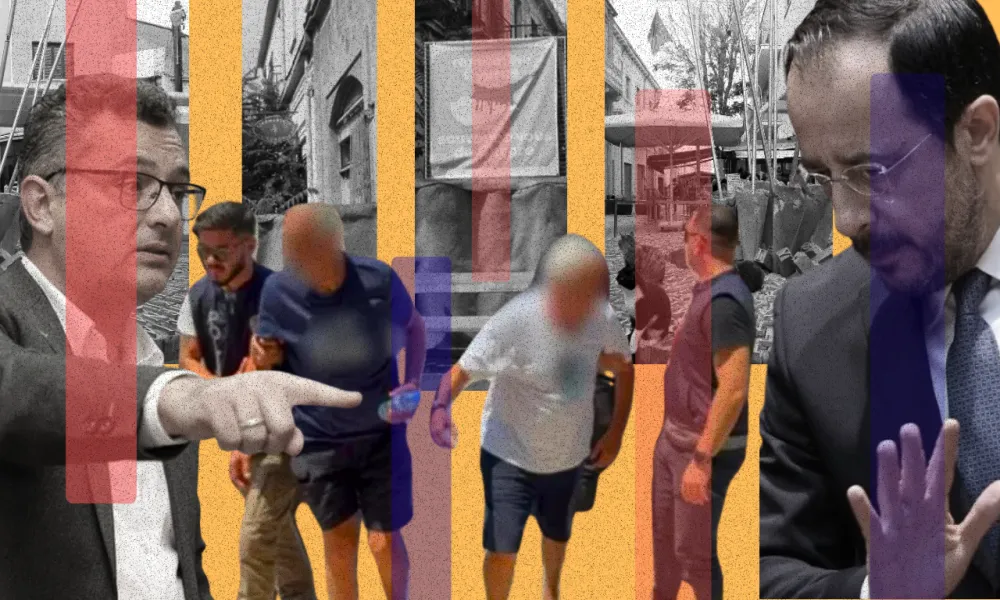Raising Tensions Won’t Bring a Settlement
Who truly believes that one of the thorniest chapters of the Cyprob, the property issue, could be resolved through the Greek Cypriot side’s new policy of chasing and imprisoning foreign usurpers of Greek Cypriot (GC) land in Turkish occupied north?
The crackdown might slow down illegal property sales in the north, but arrests alone will stop the phenomenon. Past experience proves this. In 1996, the European Court of Human Rights (ECHR) ruled in favour of Titina Loizidou against Turkey for the unlawful detention of her Kyrenia home. In 2010, the Orams case in the UK ordered a British couple to compensate Meletis Apostolidis for occupying his Lapithos land and to demolish their illegal villa. Both cases caused temporary disruption in illegal sales but did not lead to the return of any GC refugee to their property.
The real gain then was political: strengthening the principle that a Greek Cypriot refugee’s property right, despite occupation, is not expropriated. This principle fed into the Annan Plan in 2004 and the Guterres Framework in 2017, improving property provisions under a potential settlement.
The Aykut Arrests
The recent arrest of Israeli businessman Shimon Aykut, head of Afik Group, and two associates over illegal developments in Trikomo marks a third phase of Greek Cypriot action on the property issue. It has sent a signal to illegal buyers, but time has complicated matters. ECHR rulings such as Demopoulos acknowledged certain rights for Turkish Cypriots born and raised on Greek Cypriot land. Thousands of GC applications to the Court ultimately led to the creation of the TC Immovable Property Commission, offering remedies like compensation and exchange.
With time, the scale of usurpation has grown, from 1–2% of GC property in 1996 to over 8% today. Afik Group’s activities are only the latest development. Reports in the TC press cite hundreds of companies with Turkish and Israeli shareholders. Vast areas, they say, have been sold to buyers from Israel, Iran, the UK, Russia, Ukraine, and Poland.
Limits of Legal Action
Without a political settlement, the Republic of Cyprus cannot compel the Turkey-controlled administration in the north to provide meaningful remedies to Greek Cypriot owners. The Annan Plan in 2004 and the proposals at Crans-Montana in 2017, based on return–compensation–exchange, were imperfect but far preferable to today’s reality or to relying solely on the Turkish Cypriot property commission, which awards compensation selectively.
Even with more arrests, the north has adapted. Authorities there reportedly check Interpol alerts and warn wanted individuals, while foreign real estate agents avoid the Republic’s legal entry points, travelling via Turkey instead.
Political Implications
Only a negotiated solution can address the property issue meaningfully. Such a settlement would involve compromises, GCs may receive compensation or exchange rather than return, and TCs might have to vacate long-inhabited homes. But it could also allow GCs to reclaim the 90% of northern land that remains undeveloped and largely in their ownership. Without a settlement, these vast tracts will stay idle.
In today’s impasse, Tatar benefits twice over, both politically and rhetorically, by presenting GC measures as the calculated work of a nationalist hard line determined to cripple the TC economy, while steering ever further away from genuine reconciliation. UNFICYP polls suggest that, for the first time, most TC no longer support a bizonal, bicommunal federation. This bolsters the TC leadership’s refusal to open more crossings or engage seriously in talks. Retaliatory arrests of Greek Cypriot refugees visiting their land in the north have further deepened tensions.
Christodoulides government’s policies have also drawn criticism: stricter checks at crossings, failure to expand the Agios Dometios crossing as agreed, inserting “reciprocity” into confidence-building measures as if two states were negotiating, and reinstating Green Line tours for foreign visitors. Critics argue these measures play into Turkish propaganda and risk implying recognition of a separate state.
Room for Manoeuvre
If Tatar is re-elected in October, Christodoulides could continue his current approach until the 2028 presidential elections, calling for talks while blaming Tatar for the stalemate. Nationalist parties like ELAM and EDEK, which advocate closing crossings, would likely remain aligned with him.
A different scenario would arise if the Turkish Cypriots elect Tufan Erhürman, leader of the Republican Turkish Party (CTP). Erhürman supports a federation but insists on conditions, including clarity on the north’s future if talks fail due to the GCs, and reciprocity in consequences if the TCs are at fault.
Facing Erhürman would require Christodoulides to engage in real negotiations. A successful settlement could make him the first federal President of Cyprus, backed by a broad coalition rather than nationalist votes. But in his camp, the assumption is that Turkey will block a solution and keep Tatar in power. But if that forecast proves wrong, they must realise that with Erhürman at the helm of the Turkish Cypriots, the next round will be the last attempt at a federal solution. Another failure would end the Cyprus talks as we’ve known them.
